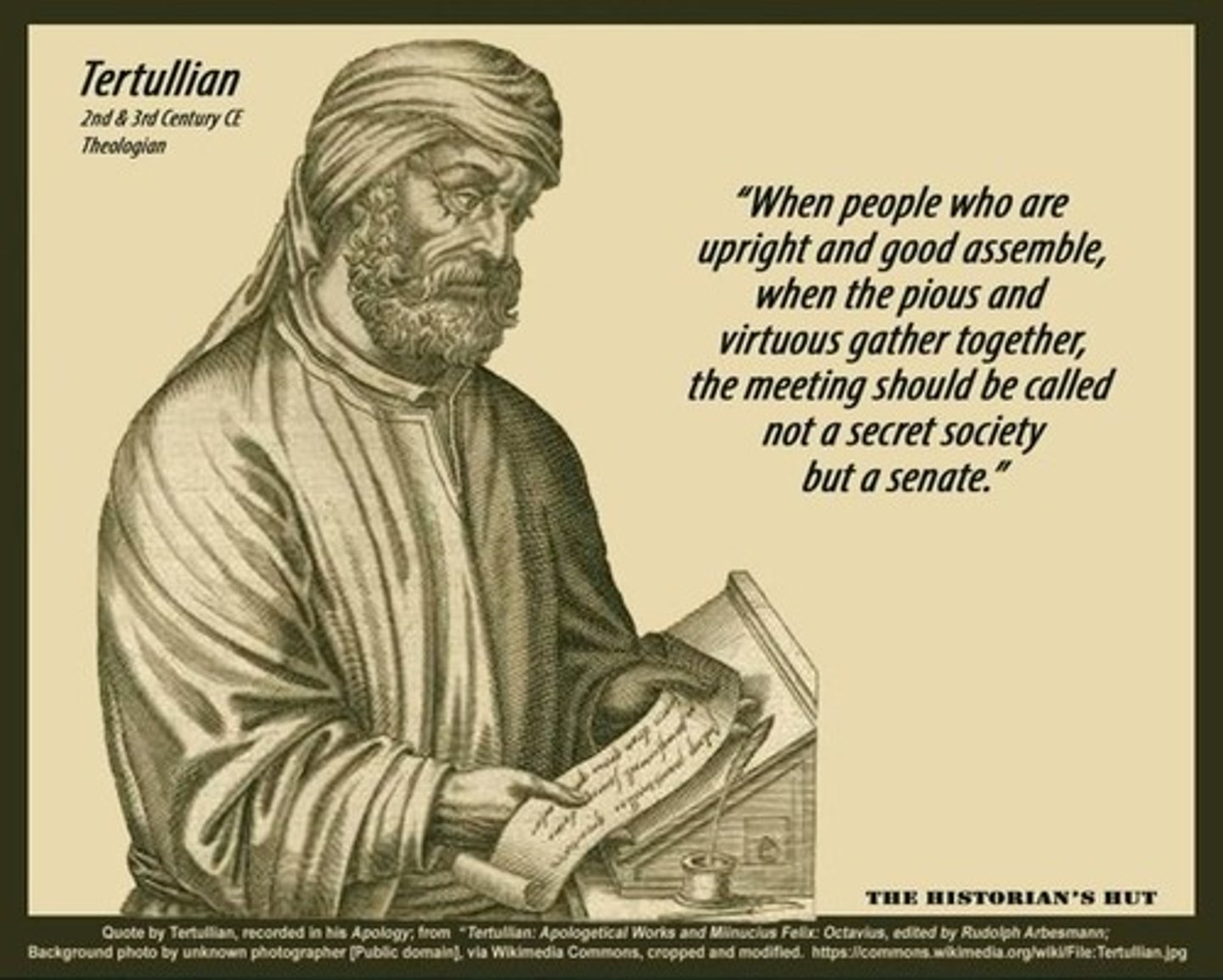Heresy, Gnosticism, and Early Church Responses
1/302
There's no tags or description
Looks like no tags are added yet.
Name | Mastery | Learn | Test | Matching | Spaced | Call with Kai |
|---|
No study sessions yet.
303 Terms
Heresy
Belief contradicting fundamental church teachings.
Hairesis
Greek term meaning 'choice' or sect.
False Prophets
Individuals promoting destructive untrue doctrines.
Gnosticism
Dual belief system involving lesser creator and Supreme God.
Demiurge
Lesser creator God in Gnostic belief.
Gnosis
Greek term for knowledge, key to salvation.
Church Fathers
Early theologians defending orthodox Christianity.
Tertullian
Church Father who wrote against heretics.

Justin of Rome
Second-century apologist opposing Gnosticism.
Neo-Platonic Philosophers
Opposed Gnosticism, viewing it as corrupting philosophy.
Nag Hammadi Library
Collection of Gnostic texts discovered in 1945.
Traditional View
Gnosticism originated as heresy in 2nd century AD.
Modern View
Gnosticism predates Christianity as independent religion.
Synecretism
Blending of Eastern, Greek, and Christian ideas.
Simon Magus
First heretic teacher mentioned in Acts 8.
Basilides
Gnostic teacher from Alexandria, 2nd century.
Valentinus
Famous Gnostic teacher from mid-2nd century Rome.
Cosmological Dualism
Opposition between good spiritual and evil material worlds.
Flawed Creation
Gnostics believe world is imperfectly created.
True God
Supreme, transcendent God beyond created universes.
Inferior Creator God
Demiurge, responsible for flawed material world.
Aeons
Lesser divine beings in Gnostic cosmology.
Pleroma
Divine fullness in Gnostic belief system.
Human Nature
Duality of divine spark and material creation.
Divine Spark
Fragment of divine essence within humanity.
Sarkic
Individuals dominated by flesh and ignorance.
Psychic
Individuals governed by mind, capable of evolution.
Pneumatic
Individuals led by spirit, responsive to divine.
Salvation
Liberation from ignorance and physical existence.
Messengers of Light
Figures like Jesus sent to enlighten humanity.
Ethics in Gnosticism
Morality evolves with spiritual development, not fixed.
Ascetic Lifestyle
Emphasis on self-denial to avoid material indulgence.
Non-Attachment
Living in the world without conforming to it.
Personal Eschatology
Belief in soul's immortality, not body resurrection.
Cosmic Eschatology
Destruction of cosmos and return to Pleroma.
Inferno of Matter
Journey through physical existence before spiritual return.
Purgatory of Morals
Moral trials faced before achieving spiritual paradise.
Three Components of Man
Body, mind, and spirit define human personality.
Ignorance of Divine Spark
Human unawareness of their true spiritual nature.
Re-embodiment
Cycle of divine spark returning to physical world.
False Creator
Demiurge's influence keeping humanity ignorant.
Seth
Third son of Adam, a messenger of light.
Liberating Gnosis
Knowledge leading to spiritual freedom from existence.
Pneumatic Gnostic
A spiritually enlightened individual in Gnosticism.
Bridechamber
Symbolic space for spiritual reunion with divine.
Apostolic Succession
Unbroken transmission of spiritual authority from apostles.
Creeds
Formal statements of Christian beliefs to combat heresy.
Canon
Official collection of biblical texts recognized by the church.
Marcionism
Dualist belief system founded by Marcion of Sinope.
Clergy
Church leaders responsible for spiritual guidance and authority.
Rule of Faith
Standardized beliefs distinguishing orthodox Christianity from heresy.
Christian Salvation
Open to all believers, not limited by birth.
Gnostic View of Christ
Believed Christ was neither fully God nor man.
Resurrection Denial
Gnostics rejected the physical resurrection of Jesus.
Evil World View
Gnostics believed the world was inherently evil.
Irenaeus
Church father who defended apostolic tradition against heretics.
Spurious Writings
False texts claimed to be apostolic in origin.
Gnostic Blasphemies
Teachings contradicting core Christian doctrines.
Knowledge as Redemption
Gnostics believed salvation came through secret knowledge.
Marcion's Canon
Early collection of texts influencing New Testament formation.
Jusatin Martyr
Claimed Marcionism spread to every nation.
Marconite Churches
Established in Rome, Egypt, Palestine, and more.
Marcion's Canon
First New Testament Canon emphasizing non-Jewish roots.
Gospel of Marcion
Based on Luke, limited Jewish content.
Edited Pauline Letters
Ten letters of Paul, heavily modified by Marcion.
Literalist View
Marcion discarded scripture parts he disagreed with.
Two Gods
Old Testament God seen as lesser and harsh.
Supreme God
New Testament God, referred to as 'unknown'.
Docetic View
Christ only appeared human, denied physical existence.
Asceticism
Strict lifestyle rejecting material creation of Demiurge.
Marriage Rejection
Marcion viewed marriage as a Demiurge's invention.
Celibacy Commitment
Marconites vowed abstinence, impacting community sustainability.
Fasting Regulations
Marcion imposed strict fasting rules on followers.
Eucharist Restrictions
Wine disallowed, meat prohibited, fish permitted.
No Resurrection
Marcion expected no future return or resurrection.
God of Love
Jesus revealed a loving God, unlike the OT God.
Spiritual Fellowship
Belief in spiritual connection with God only.
Historical Context
Marcion lacked overview of history or Christ's past.
Marcion's Impact
Influenced early Christian thought and heretical movements.
Hinson's Quote
Jesus revealed love, no resurrection or judgment.
Robin Lane Fox
Described Marcion's view on Old Testament God.
Eucharist
Christian sacrament commemorating Jesus' Last Supper.
Docetism
Belief that Christ's physical body was an illusion.
Salvation by Faith
Marcion's belief in faith as the path to salvation.
Salvation by Gnosis
Gnostics' belief in knowledge as the path to salvation.
Cosmological Myth
Narrative explaining the universe's creation and structure.
Physic
Material aspect of existence in Gnostic thought.
Literal Interpretation
Marcion's approach to understanding the Bible text.
Allegorical Interpretation
Gnostics' method of interpreting scripture symbolically.
Schismatic Church
Marcion's church, separating from mainstream Christianity.
Church's Reaction
Response to Marcionism reaffirming unity of God.
Old Testament Canon
Collection of books affirmed by the early church.
Three C's
Clergy, Creeds, and Canon as church's response to heresy.
Unity of God
Tertullian's argument against Marcion's view of God.
Montanism
Movement emphasizing prophetic revelations and ecstatic experiences.
Montanus' Prophecy
Ecstatic prophecies reflecting Montanus' pre-Christian practices.
Montanus
Founder of Montanism, claimed prophetic authority.
Paraclete
Term for the Holy Spirit in Christian theology.
Ecstatic Worship
Spiritual practice involving intense emotional expression.
Prisca
Female prophet and colleague of Montanus.